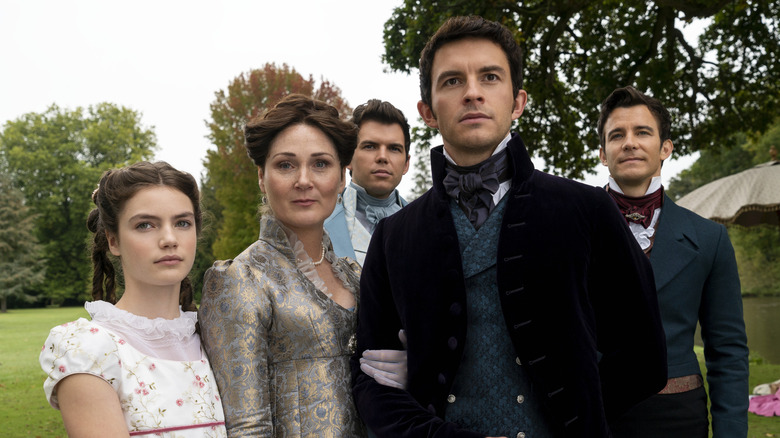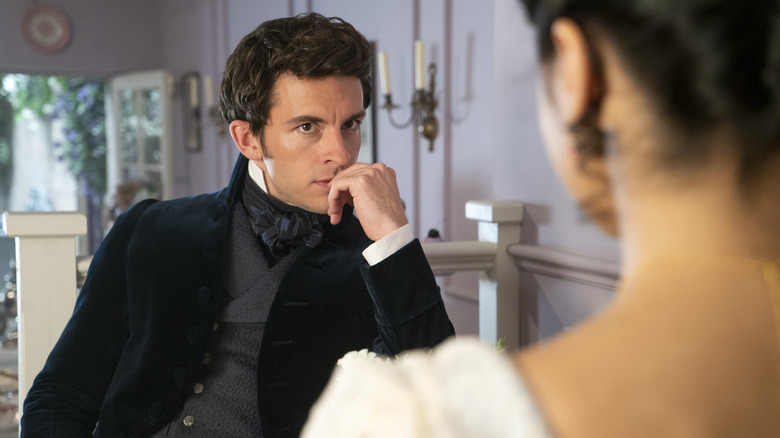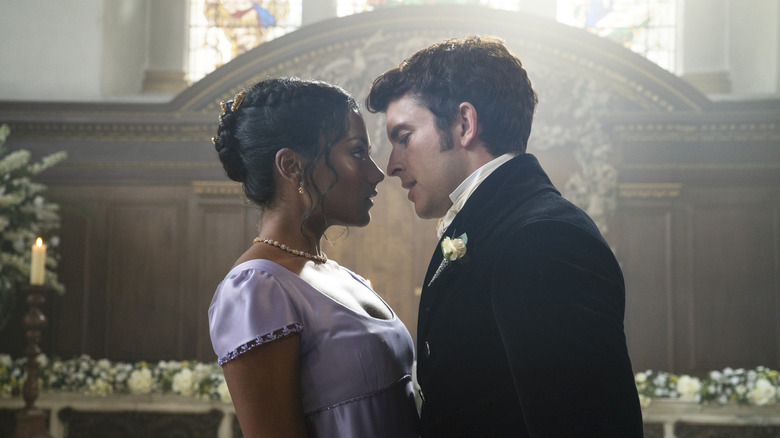What Is A Viscount In Netflix's Bridgerton?
While Netflix's "Bridgerton" isn't true to real English history in many ways, it does maintain a general accuracy when it comes to the ranks of the nobility, the customs of the Ton, and the nature of courtship during "the season" (with some big added drama, of course). The order of importance and prestige in the aristocracy is never laid out explicitly on the show, but enough characters of different rank come and go that viewers can piece together some of the basics. In season 1, for instance, Simon Bassett (Regé-Jean Page) is a duke, which stirs up quite a fervor when he arrives in town and begins wooing Daphne Bridgerton (Phoebe Dynevor).
Simon is good friends with Anthony Bridgerton (Jonathan Bailey) as well, though their ranks aren't quite as comparable as you might assume. Anthony is a Viscount, inheriting the title from his late father. When he marries Kate Sharma (Simone Ashley) in "Bridgerton" season 2, she thus becomes his Viscountess. If you came to "Bridgerton" from the novels on which the show is based, written by Julia Quinn, you'll know that Anthony's novel is called "The Viscount Who Loved Me," drawing extra attention to the importance of his station.
The rank of Viscount places Anthony very high on the pole for English high society, but there are several more powerful titles between him and the illustrious dukedom.
Viscount isn't as high of a rank as you might think
In essence, the social order seen in the Regency England of "Bridgerton" has a five-rank hierarchy, which is accurate to the real history. Dukes are at the top, followed by the ranks of Marquess, Earl, Viscount, and Baron at the bottom. This order of ranks is known as the "peerage system," and anyone holding one of those titles is given a certain degree of governmental power. This puts Anthony and the Bridgerton family over many, but still just fourth-highest in peerage rank.
Being a member of the peerage still confers political power in modern-day England, though the House of Lords has been greatly reformed in modern times to make the governing body less hereditary and more diverse (at least, in theory).
The differences in rank bring other distinctions in wealth and responsibility, such as the amount of land owned and managed by an individual. In "Bridgerton," for example, we see that Simon's estate is massive, and he spends a great deal of time managing the goings-on there, as opposed to the more centralized financial accounting that occupies Anthony Bridgerton.
Bridgerton takes some liberties with British nobility
While the order of titles and general responsibilities in "Bridgerton" are pretty true to life, there are, of course, divergences. The biggest and most welcome is the main piece of alternate history in "Bridgerton," in which land and titles were redistributed to make for a more diverse and equitable aristocracy. We also get a much less reserved and proper, more action-hero-oriented picture of viscounts, dukes, barons, and the other members of the peerage.
For the most part, "Bridgerton" does a good job balancing the historical trappings and aesthetics of its stories with a more modern sensibility and plenty of flashy TV fun. With luck, "Bridgerton" season 4 will be just as strong as.


